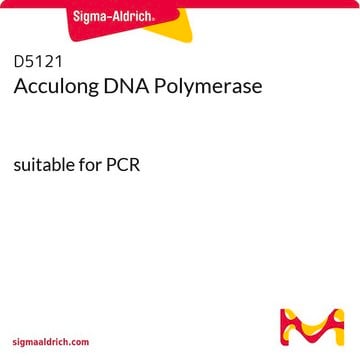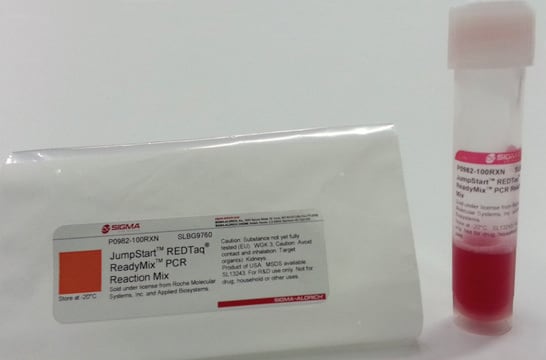71085
KOD DNA Polymerase
High fidelity DNA polymerase designed for accurate PCR amplification of DNA templates for general cloning and cDNA amplification applications.
Synonym(s):
High fidelity PCR, High fidelity polymerase, KOD polymerase
About This Item
Recommended Products
recombinant
expressed in E. coli
Quality Level
Assay
≥90% (homogenous band, SDS-PAGE)
usage
sufficient for 250 reactions
5′ exonuclease activity
<2%, 74 °C (1 h incubation in a reaction with 5′-labeled λ/Sca I digest, per unit enzyme)
secondary activity
nicking (none detected)
feature
Difficult Templates/Specialty Enzymes PCR
High Fidelity PCR
dNTPs included
hotstart: no
manufacturer/tradename
Novagen®
storage condition
OK to freeze
concentration
2.5 unit/μL
technique(s)
PCR: suitable
input
purified DNA
suitability
suitable for PCR
shipped in
wet ice
storage temp.
−20°C
Gene Information
Thermococcus kodakaraensis ... TK_RS00010(3233723)
General description
Our analysis has shown that KOD enzymes are an easy choice for fast, accurate and high-yielding PCR. Our molecular biologists work to develop and formulate polymerases offering the highest specificity, fidelity and yield during PCR amplification. In addition, optimized buffer compositions, convenient master mixes and cycling parameters provide additional ease of use and data reproducibility.KOD DNA Polymerase (formerly KOD HiFi DNA Polymerase) is a recombinant form of Thermococcus kodakaraensis KOD1 DNA polymerase. KOD is a high fidelity thermostable DNA polymerase that amplifies target DNA up to 6 kbp with superior accuracy and yield for PCR applications. The enzyme′s 3′→5′ exonuclease-dependent proofreading activity results in a lower PCR mutation frequency than any other commercially available DNA polymerase. The elongation rate and processivity are 5 times and 10 to 15 times higher, respectively, than for Pfu DNA polymerase, resulting in highly accurate and robust yield, in a short reaction time. The enzyme generates blunt-ended PCR products suitable for cloning with the Novagen Perfectly Blunt® and LIC Vector Kits.
Application
Features and Benefits
- Higher fidelity than Pfu DNA polymerase excellent for cloning
- Greater yield extension speed is 2X faster than Taq DNA polymerase and 5X faster than Pfu DNA polymerase
- Higher processivity sequential nucleotide polymerization is 10- to 15-fold greater than Pfu and Tli DNA polymerases
- Amplifies plasmid and lambda DNA templates up to 6 kbp
- Amplifies genomic DNA templates up to 2 kbp
- No truncated amplification products
Components
- 250 U KOD DNA Polymerase (2.5 U/μl)
- 1 ml 10X Buffer #1 for KOD DNA Polymerase (pH 8.0)
- 1 ml 10X Buffer #2 for KOD DNA Polymerase (pH 8.8)
- 1 ml 25 mM MgCl
- 1 ml dNTP Mix (2 mM each)
Warning
Unit Definition
Legal Information
related product
Signal Word
Warning
Hazard Statements
Precautionary Statements
Hazard Classifications
Aquatic Chronic 3 - Eye Irrit. 2
Storage Class Code
10 - Combustible liquids
WGK
WGK 2
Certificates of Analysis (COA)
Search for Certificates of Analysis (COA) by entering the products Lot/Batch Number. Lot and Batch Numbers can be found on a product’s label following the words ‘Lot’ or ‘Batch’.
Already Own This Product?
Find documentation for the products that you have recently purchased in the Document Library.
Customers Also Viewed
Our team of scientists has experience in all areas of research including Life Science, Material Science, Chemical Synthesis, Chromatography, Analytical and many others.
Contact Technical Service
















